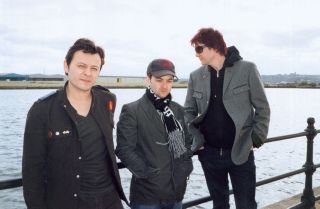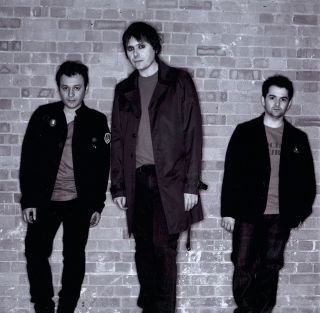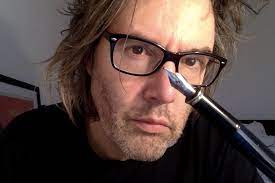There’s a story that Manic Street Preachers bassist Nicky Wire tells. It’s early autumn 2006, and he’s finished up the final rounds of press for his solo album I Killed The Zeitgeist and has taken the train from Wales to London. Among the items in his bag is a cassette tape and a sheet of handwritten lyrics. Manics singer James Dean Bradfield is still living in Chiswick, west London, so they meet at Paddington station. Wire has written what he feels is his first real song – including the melody and vocals – for the band, Your Love Alone, and also the words for a song that would become Rendition.
Sitting beneath the high eaves of the station’s Victorian glass and steel roof, pigeons becoming a blur of grey traces above the shunting of trains, Wire and Bradfield swap notes and arrange to reconvene that afternoon.
Fast forward a few hours and Wire is on another Great Western train, staring out of the window as it snakes away from the arches of Paddington station, through London suburbs and then into the countryside as he heads west. His Sony Walkman cassette player sits on the table in front of him. He leans his head back and listens to an almost complete version of Your Love Alone, and then is surprised to find an acoustic take of Rendition, almost fully formed, lyrically indignant, melodic and rich…
“It was a truly magical day,” Wire says, over a late breakfast at the Haymarket Hotel in London. He and the band spent the previous day signing 1,000 vinyl copies of the anniversary reissue of their 2007 album Send Away The Tigers. Wire is sprightly, seemingly enlivened by remembering a glorious year in the band’s history and the reinvention that the Tigers album brought them.
“I’d done the bare bones of the demo,” he recalls, “which was slower and more Bob Dylan-like, and I had the idea of Nina [Persson, The Cardigans] singing the verse. I remember James coming to our office with the cassette that afternoon and saying that he thought he’d finished it. And then just being on the train and hearing what he’d done with Your Love and thinking: ‘We’ve got it.’ Up until that point we’d had Autumnsong and I’m Just A Patsy and Send Away The Tigers, but not that single, and then it was like, yep, the album’s done.”
“Nick had done such a good job of the verse,” Bradfield says. “He’d done that thing of making it so fucking memorable that no chorus can top it. I remember having that sense of responsibility to finish off the music for Love Alone, and then opened up Rendition and I thought: “Jesus Christ, I’ve got to go from that lyric to this lyric,” but it shows just what a great job I’ve got. I knew we were bang-on, we were there; it was going to be a good album. It was an amazing day, and that was the day that I felt like I was back in the Manics again.”
For drummer Sean Moore it was Patsy. “It was almost a sense of pride. That song made me feel like we were back as a band.”

So how did a band so in touch with their history lose sight of themselves? It had been three years since their glacial (their word) Lifeblood album, a clinical and cool exercise in making m
usic, the band recording and working separately and creating an album that occasionally glimmered brilliantly but was removed from the original Manics ethos and their impassioned drive.
“Lifeblood was quite cold-blooded,” says Bradfield. “And it was quite unnerving to feel like that, for a band that were so well-connected to their past and history and their geography in terms of nationality. For a band like that to actually feel ruthless was strange.”
Stranger still that Lifeblood had followed 2001’s frenetic, barracking Know Your Enemy, which careened stylistically like a car having hit a patch of black ice. Both of those albums only added to the idea that the Manics had somehow lost their way.
“We did sort of lose it during that album. Enemy was two fingers up to everyone – including ourselves,” Moore says cheerfully. “It was confused, a mess, but I think that’s probably when we’re at our best, when we’re cornered.”
“We had started to drift,” admits Wire. “We liked being at home a lot, looking forward to food and going to bed, having a drink…”

After the Lifeblood cycle finally wound down, Wire, Moore and Bradfield went their separate ways for nine months – an age for a band who had literally grown up together. Moore became a dad for the first time. “I used the time to get to know my child and help out; those two went off to make solo albums,” he recalls. Wire created the abrasive I Killed The Zeitgeist record (“I think it wasn’t so much a musical expression – dare I say it, it was more installation art than anything,” Moore says), while Bradfield delivered the ever mellifluous The Great Western – more, it turns out, by necessity than by design.
“If there was ever any doubt in my head that there was a life outside of this band, then making that album completely disproved it,” Bradfield says of Great Western. “If I have to really want to say something, then the Manics is the way. If I really want to satisfy the fifteen-year-old in me, then it has to be with the Manics.”
He didn’t enjoy his enforced break from the band, then?
“No, I didn’t. That’s why I did the solo album, to be honest. I think two or three months in of the Manics not doing anything left me feeling like I had no purpose. I’m institutionalised by the band and all that goes with it. To have that taken away from me was just horrific, it really was. Hence the solo album. I can’t live without making music. Gardening was interesting for about a week. Then I started trying to learn a bit more French and that waned after a couple of days, then I started trying to get fit again and that was just hopeless. I couldn’t manage. I just couldn’t do it. ‘So, I’ll do an album!’”
While Bradfield clung to his solo record the way a drowning man clings to a passing piece of driftwood, Wire considers the solo albums and the time the three of them spent apart as beneficial not only to the band but also to the creation of Send Away The Tigers.
“It helped in two ways,” he says. “It helped us clear the decks and get it out of our system, and I also really then learnt to play acoustic guitar and wrote a lot of music, a lot of which was shit, but that was the impetus for a song like Love Alone. Plus it did allow us to breathe and relearn and have a break from each other and miss the band.”

Send Away The Tigers features a quote from writer Wyndham Lewis on its sleeve: “When a man is young, he is usually a revolutionary of some kind. So here I am, speaking of my revolution.” If Tigers taught the Manics anything, then it showed them how to not only connect with an audience again, but also to reignite the fearlessness that once typified their earlier albums. All in all, it made for a new kind of musical revolution.
“We were completely fearless back in the early years of the band,” Wire says with a nod. “And we knew that if we could harness those ideas and ethos, but in a slightly more grown-up and constructive way, then there was a point for the band to continue, that we had a future. But we had to look back to go forward. We had to be inspired again. Whereas Lifeblood was an incredibly internal and personal album – the lyrics on there actually give me a chill – Tigers gave us the freedom to realise that whatever we do, it has to be a hundred per cent committed with ideas and energy, because without that we don’t connect with people as much. And we wanted to connect on a grand scale; we want midweeks where we’re number one on the charts. We always wanted to be massive, we weren’t po-faced indie kids.”
Ideas weren’t an issue. The album, demoed at the band’s original Faster studio in Cardiff and then fleshed out in the Irish countryside at Grouse Lodge, thrummed with life. Comedian Tony Hancock’s immortal phrase to describe his bouts of depression gave the album and lead track its title; they referenced John F Kennedy killer Lee Harvey Oswald in Patsy; actor Jack Lemmon’s name appeared in the lyrics for Rendition, which took its cue from the act of extraordinary rendition being practised by the US government (Bradfield: “It’s like some bands won’t recognise the awfulness that is going on around you, that there’s more to life than fucking relationships. That’s not us”); Imperial Bodybags referenced the ongoing Iraq War; and the elegiac The Second Great Depression drew parallels between the loss of their bandmate and best friend Richey Edwards and America’s social and financial crash. Musically the album straddled the fiery, windmilling glory of Generation Terrorists and the adroit and glossy pomp of Everything Must Go. It rang so bright and true that it almost sounded burnished.

“Do you remember the plexiglas guitars, the clear ones Dan Armstrong made?” Bradfield asks. “Keith Richards used to play them, Joe Perry too. I’d always wanted to make an album that reflected the feelings that guitar evoked in me: transparent but distorted, full of rock’n’roll lineage but somehow modern, sleek yet heavy, glamorous in its own strange way.”
“We knew we were on to something really early,” Wire recalls of the writing and recording process. “We literally had to stop ourselves at one point, because we could have recorded it on the spot in Cardiff, but we wanted to go to Ireland; we wanted to get away and go there together. That was really important for the three of us. And it was there that we added all the glamour and the gloss to it. That’s why we wanted Chris Lord-Alge [Bon Jovi, Green Day, Stone Temple Pilots] to mix it as well. I remember our last day in Ireland and we got his first mix of Indian Summer – it had come over from LA – and it just blew me away. It was compressed and just glorious. Our producer, Dave Eringa, was a bit worried that it was too compressed, but I knew that on the radio it was going to be fucking massive.”
Though neither would feature as singles, two songs typified the resurgent spirit and songwriting strength evident throughout the album: the strident title track and the undulating The Second Great Depression. Both dealt with loss in their own way, the former tackling such thorny subjects as the fall of Baghdad and the suicide of Tony Hancock, the latter looking at Wall Street’s Black Tuesday crash and the ongoing disillusionment of grief and loss with specific regard to their former guitarist. To reiterate Bradfield’s words: there’s more to life than fucking relationships.
“Both those lyrics are special,” says Bradfield. “I loved that Nick used political and social depression as a metaphor for something else. Me and Sean were in the studio that day, and I said to him: ‘Come on, you start writing this one [Depression],’ and he came up with the verse within twenty minutes. Whenever Sean gets involved you always get something that’s essentially quite simple but it just works. That’s what happened on an old song like You Love Us. I just got my guitar out and Sean sang it. It all happened within thirty minutes. And it was such a relief that he and I could just do that together still, because we had stopped doing that for a while. That was another thing that the album brought back to life, us writing together.
“And people might not realise this, but Tigers was also the first time I’d managed to blend the orchestra sounds into the band properly – that Morricone, Motown kind of ELO stuff, the perfect blend of punk and classic rock. So it was important in so many ways.”

Due in part to the success of the Your Love Alone single, Tigers was also the album would bring them back into the public eye – it narrowly missed hitting the No.1 spot in the UK album chart, falling short by just a few hundred sales. Wire’s idea of melding Bradfield and Nina Persson’s vocals struck a resolute chord with music fans across Europe and around the world.
The album all but complete, Wire and Moore headed home, while Bradfield was dispatched to New York to oversee Persson’s vocals for what would become the album’s second single and its clarion call.
“The demos for Love Alone weren’t great,” Bradfield confesses. “It sounded like The La’s, who I love, but it wasn’t how we wanted it to sound. It was the one song that we were scared that we weren’t going to nail. But of course it became the song that allowed us to be a rock band with a pop sensibility again.
“I remember going into the studio with Nina in New York and she did the whole vocal in three takes, which is intensely annoying, it really is. I never do a vocal in three takes – I’m never relaxed on the first couple, I’m feeling it out. But she did a test run, then did a take, and then did another just to be sure and that was it. It just flowed out of her. I can remember thinking: ‘If we could only get her to do a whole album with us, it would be the Welsh Blondie!”
The Manic Street Preachers were a band renewed. In 2007 they went from theatre shows and back to arenas by the year’s end. You only have to listen to the extra disc of B-sides that comes with the anniversary edition of Tigers to experience the sound of a band who’d rediscovered their groove. One, Welcome To The Dead Zone, has even made it into the revamped Tigers track listing. “It should have always been on there,’ says Wire. “It’s in our top three B-sides ever.”
There’s another story that Wire tells, another one about the Manics reborn.
“This is so indicative of where we were as a band at the time. We literally flew back from playing to sixty thousand people in Tokyo Stadium at this amazing festival show, got some sleep that night, and the next morning got up to make the video for Indian Summer. It was the kind of band energy we had on Generation Terrorists, it really reminded me of that. Put it this way: if that had been around the time of This Is My Truth Tell Me Yours, I’d have come back, cancelled the video and demanded five days off! But that whole summer was so vibrant. We were writing, recording and playing, just banging it out.
“I look back with nothing but utter fondness for that year – and it was fucking hard work, too. That’s why I think we enjoyed it, because it was an old‑school work ethic, like having a proper job, and we were doing it for the second time at a point in our careers where we didn’t think we’d ever get to do that as a band again.”
A lopsided grin and a word not usually bandied about by the Manics: “It was completely joyous.”
Send Away The Tigers – 10 Year Collectors’ Edition is available now via Sony Classics.
Manic Street Preachers - Send Away The Tigers, 10 Year Collector’s..album review
What happened when Manic Street Preachers met Fidel Castro
Manic Street Preachers: "After Design For Life, I knew we could come back"


